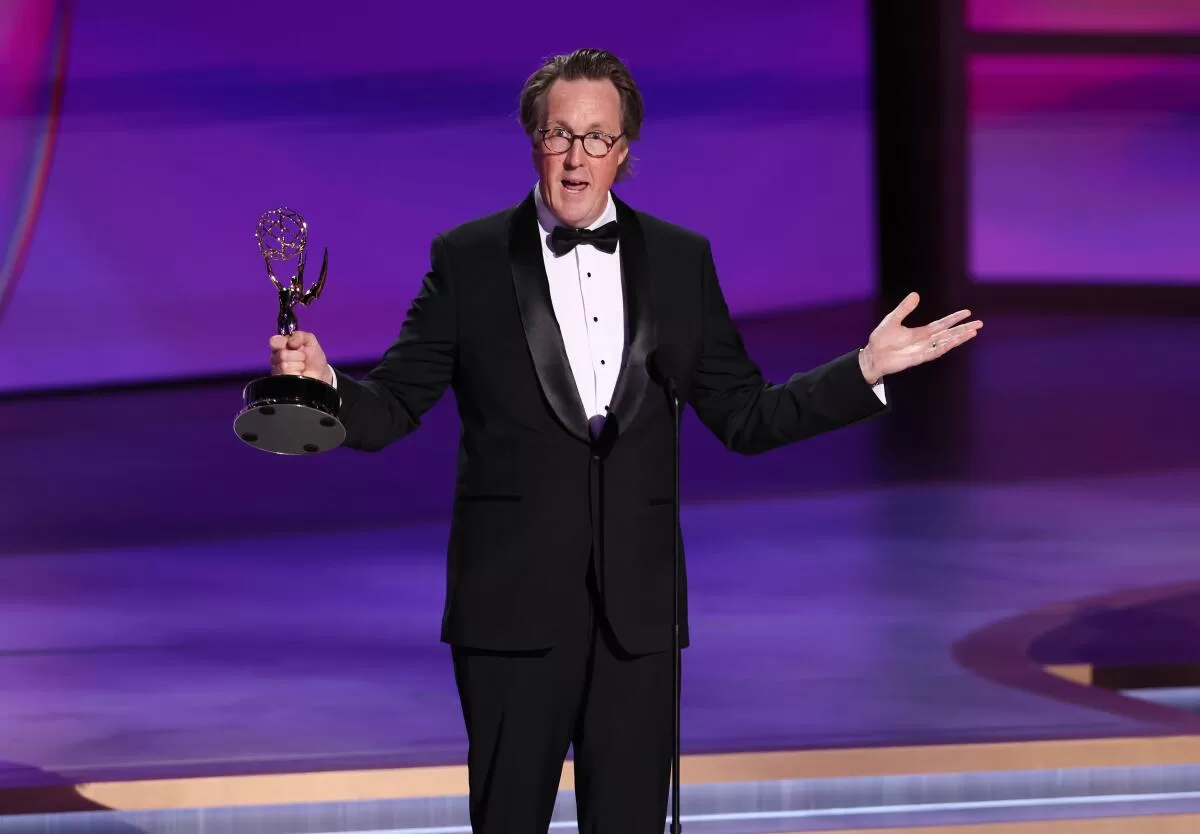On Sunday night from the Peacock Theater, the 76th edition of the Primetime Emmy Awards were broadcast, and let’s all take a moment to appreciate the fact that there have been 76 of these things. Three quarters of a century! Seventy-six years before the first Emmys, whose host, Walter O’Keefe, would become a minor running joke throughout the night, there was not only no television, but no movies or radio or record business. There were 37 states.
But most important, this year’s award was the first to feature Eugene and Dan Levy as co-hosts.
These events are better and worse variations on a well-worn template, interesting mostly in the minor ways they depart from the previous years broadcast — with the exception of 2020, the lockdown Emmys, which were also the Emmys when “Schitt’s Creek,” the Levys’ co-starring co-creation, ran the table for comedy awards.
Sunday night, they came onstage with no preliminary fuss, in their tuxedos (double-breasted for Eugene) and matching eyebrows, and welcomed us to the Emmys, “also known as broadcast TV’s biggest night for honoring movie stars on streaming services,” and got down to business.
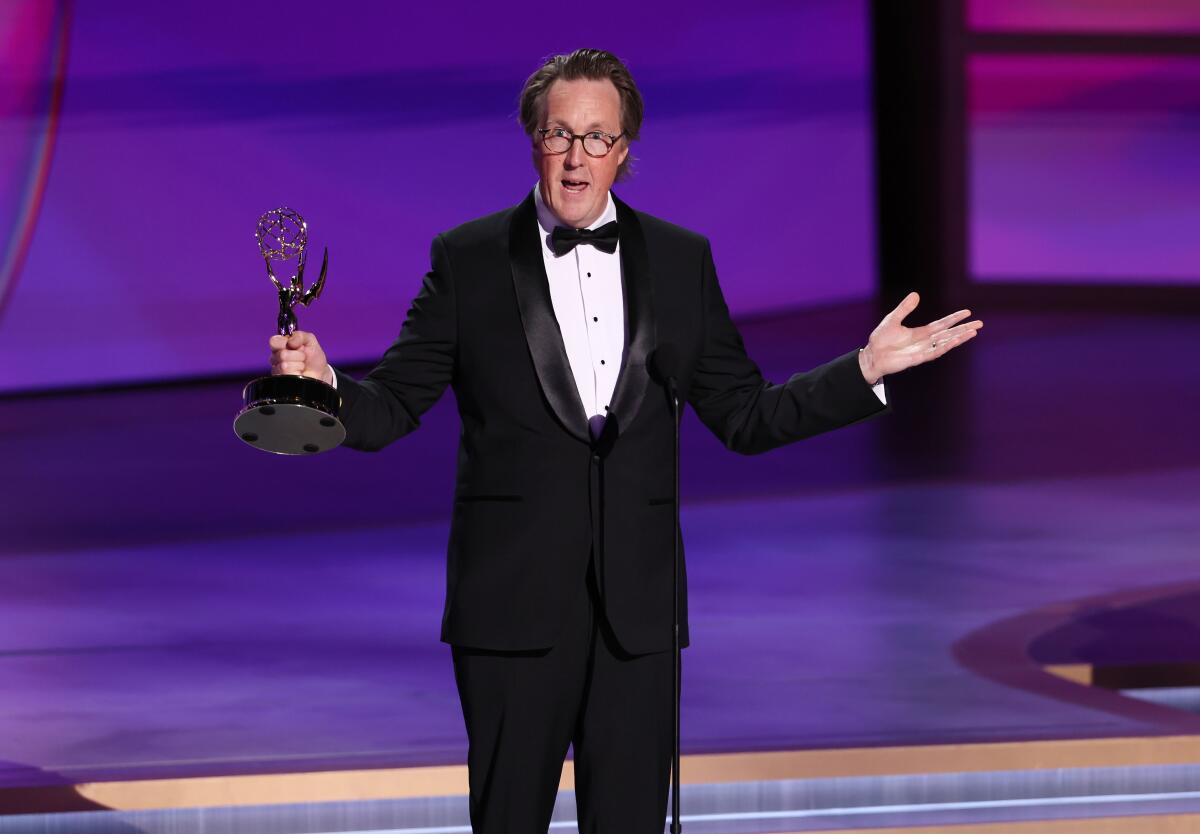
Will Smith (no, not the film actor) accepting the writing for a drama series award for “Slow Horses.”
(Robert Gauthier/Los Angeles Times)
When I spoke to the hosts in advance of the event, Dan said, “We’re going to keep it light and bright,” and Eugene said, “You want it to be funny, but maybe it’s a kinder, gentler approach.” And this was one of the least waspish awards shows in memory, with few jokes at the expense of actors or shows, apart from one about “The Bear” being a comedy without jokes. If it was free from controversy, unfortunate jokes and physical brawls (“Despite my name, I come in peace,” said “Slow Horses” creator Will Smith), it wasn’t dull — more what I’d call casually interesting, like watching pretty scenery roll by. Overall, it was a sweet, positive show that at the same time avoided the air of self congratulation that often hangs around these events.
The father and son dynamic — affectionate, but doubting — was at the heart of their shared time onstage, with Dan the hipper son and Eugene the slightly befuddled father. They joked that their Canadian niceness would make it difficult for them to play off winners, and that Eugene especially was feeling the pressure. “The man is frailer than he looks,” Dan said. “He gets palpitations from time to time.”
Indeed, age was a theme of the evening. “Even though we’re on ABC, [76-year-old] Emmy is watching CBS,” joked Dan in reference to the latter’s demographic, and supposed that Eugene would be excited about the new “Matlock” reboot because he’s in the demographic that’s “in the know.” When presenter Billy Crystal got a reaction from the audience when after mentioning it had been 50 years since his first talk show appearance, he asked, “You’re applauding that I‘m old?” Selena Gomez described co-presenters Steve Martin and Martin Short as “two guys who are this far away from being childless cat ladies.”
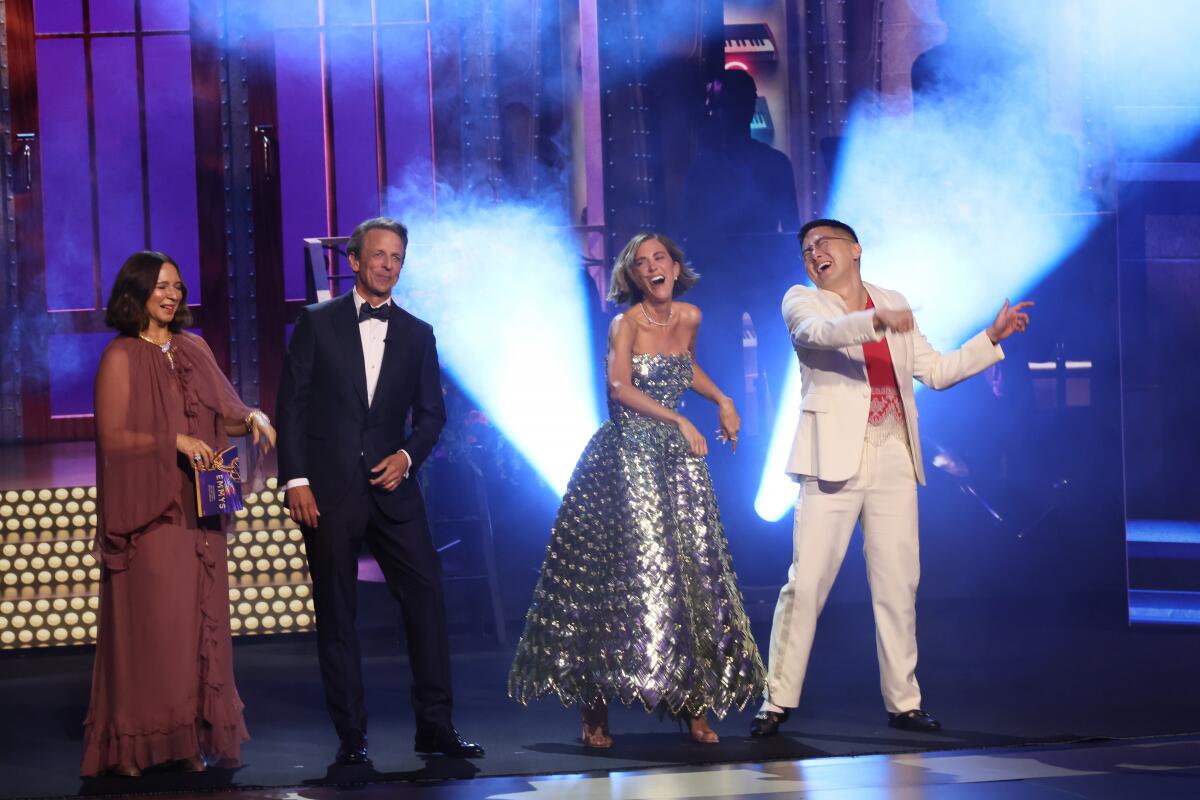
From left, Maya Rudolph, Seth Meyers, Kristen Wiig and Bowen Yang in a segment at the Emmys for the 50th anniversary of “Saturday Night Live.’
(Robert Gauthier/Los Angeles Times)
As usual, nostalgia was woven into the fabric of the evening. A less than successful repeating segment had groups of actors who had played teachers, cops, lawyers, doctors, coaches, villains, TV moms and TV dads, respectively, who, after some thematic banter, would go on to present an award. We got a “West Wing” “reunion,” a quartet of “Saturday Night Live” (not ready for prime time) players — Seth Meyers, Kristin Wiig, Maya Rudolph and current player Bowen Yang — to mark the show’s upcoming 50th anniversary — and Ron Howard and Henry Winkler on a suggestion of a “Happy Days” set. There was nothing extraordinary about seeing them together, but the bit they played allowed, or required, Winkler to hit a jukebox and deliver a half-hearted “Eeh,” or however you spell that sound that Fonzie used to say. Still, the concept as a whole underscored the element of time always present in such shows, with their mix of elder statespersons and bright young stars, beloved by or unrecognizable to various segments of the audience.
Time is, of course, most vividly on display in the in memoriam segment. Usually a much criticized disaster in which the honored dead are half-hidden behind whatever performer the producers have scored to sing an inspirational song — this year it was Jelly Roll and his “I Am Not Okay” — it was, for once, adeptly handled, with photos of the departed separate from footage of the singer. Final face Bob Newhart led to a lovely tribute from Jimmy Kimmel, who has a talent for speaking, or at least seeming to speak, off the cuff. (“He did not have range — he didn’t need to have range.”)
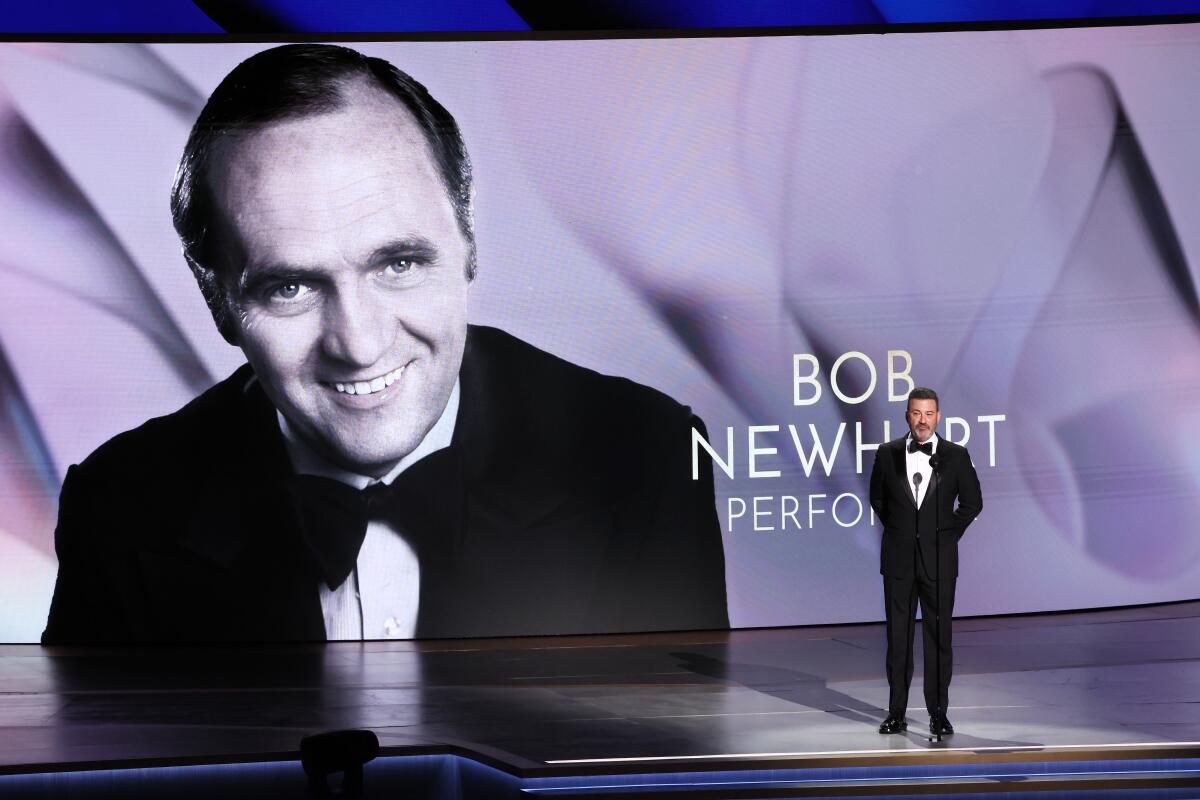
Jimmy Kimmel spoke about the legendary actor and comedian Bob Newhart, who died in July, during the in memoriam segment.
(Robert Gauthier/Los Angeles Times)
A sort of diversity block began with a white-tuxedoed John Leguizamo declaring, “I’m one of Hollywood’s DEI hires,” DEI standing for diligence, excellence and imagination, by which standard, he said of the assembly, “we are all DEI hires.” He went on to speak of the days when Latinos rarely played Latinos and available characters were restricted to “the spicy sexpot, the Latin lover, the maid, the gang banger.” (“I used to watch ‘Star Trek’ and think, ‘Wow, in the future there ain’t gonna be no Latin people.”)
Acknowledging progress, the actor, who took out an ad in the New York Times imploring the Academy to bring more Latinos into the industry, noted that “it turns out not complaining doesn’t change anything. What I see here tonight makes me almost happy and certainly less angry.”
Leguizamo the introduced Cris Abrego, the first Hispanic chair of the Television Academy, who spoke up for inclusion and who passed the show off to Matt Bomer and Joshua Jackson, who introduced Governors Award honoree Greg Berlanti, who spoke of being a closeted gay kid, in a time before the internet and advocacy groups, when the only way he could tell if someone was gay “was if he also watched ‘Dynasty’ and ‘Dallas’ and could name all four of ‘The Golden Girls.’”
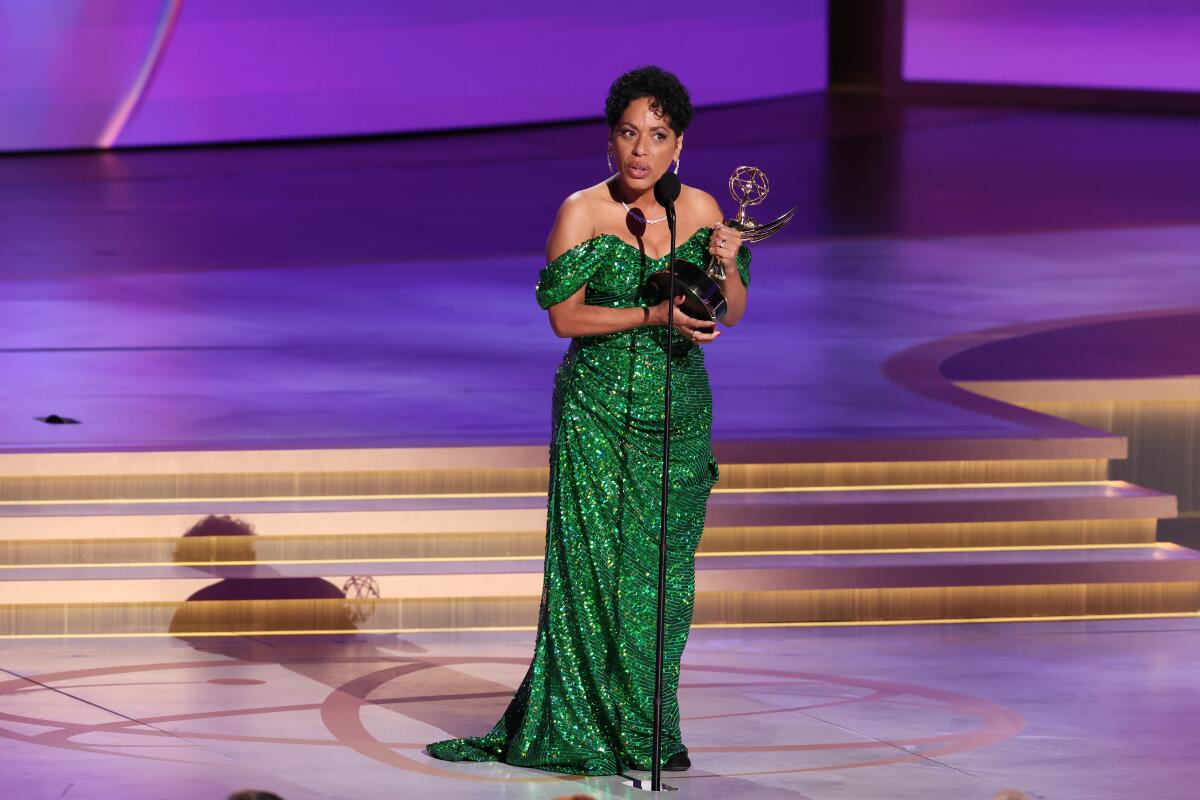
Liza Colon-Zayas implored viewers to vote during her acceptance speech for supporting actress in a comedy for “The Bear.”
(Robert Gauthier/Los Angeles Times)
As to the political world raging outside the theater, there were a few nods. “For all the Latinos who love to love me, keep believing and vote — vote for your rights,” said Liza Colón-Zayas, who won best supporting actress in a comedy for “The Bear,” in her acceptance speech. The “West Wing” reunion made note of real-world storylines their writers “would have deemed far-fetched if not utterly ridiculous.” And Candice Bergen pulled into focus recent events, recalling the controversy stirred by then-Vice President Dan Quayle over her “Murphy Brown” character, who was raising a child as a single, unmarried woman. ”Oh how far we’ve come,” Bergen said. “Today, a Republican candidate for vice president would never attack a woman for having kids. So as they say, my work here is done. Meow!”
If anyone doubted that the Levys would be the only 2020 comedy winners onstage Sunday, they were eventually disabused of the notion. Annie Murphy, Dan’s fictional sister and Eugene’s fictional daughter, was discovered standing with them before the evening’s final award, for best comedy, and after some banter, Catherine O’Hara, as glorious as ever, emerged to present the Emmy — with an envelope stuck to her back, produced after she tore up the one she held in her hand (“Must we really choose just one winner?”). The award went to “Hacks,” as if to continue a theme, a series starring (Emmy winner) Jean Smart, 73, and Hannah Einbinder, 29.
And all through the broadcast, there was Carol Burnett, 91 and nominated, picked out repeatedly in the audience, enjoying herself immensely. It was, all in all, a Carol Burnett Enjoys Herself Immensely sort of evening.
